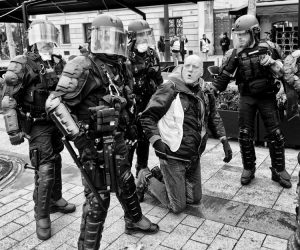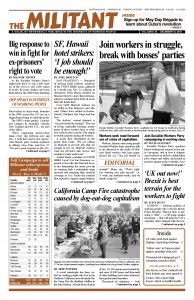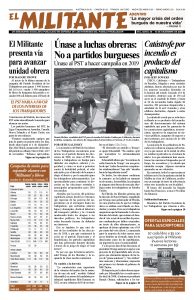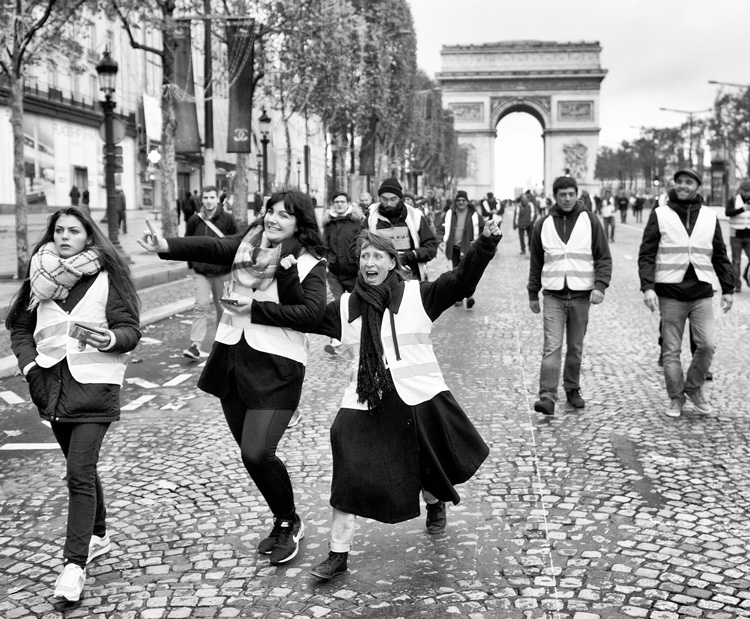PARIS — In the latest in a series of demonstrations sweeping France, over 100,000 people — known as the “yellow vests” for the yellow reflective safety vests they wear — marched and blocked roads across the country Nov. 24. The ongoing mass protests of workers and some middle-class forces, especially in rural and working-class suburban areas, are protesting President Emmanuel Macron’s “green taxes” on fuel and other government attacks on their livelihoods.
They are outraged at the disdain of the rulers and their politicians for the increasing challenges they face amid today’s economic, social and moral crisis of capitalism.
The “yellow vest” movement began with a Nov. 17 nationwide protest of over a quarter of a million blockading traffic in more than 2,000 locations. Since then, two people have died, hit by panicked drivers, and hundreds have been injured in attacks by police and others. In Paris, Nov. 24, protesters trying to gather near the presidential Elysee Palace were repeatedly attacked by cops firing tear gas and water cannons.
These unorganized workers, truck drivers, family farmers and small traders sometimes defiantly refer to themselves as “les beaufs” (rednecks). This is an acknowledgement that the ruling class, and its meritocratic upper-middle-class supporters, concentrated in Paris, have nothing but contempt for these provincial “deplorables.”

The workers call Macron — a former investment banker at Rothschild & Co — the “president of the rich.”
The movement has been denounced as populist or even fascist by much of the liberal news media and the Stalinist and Social Democratic left of bourgeois politics, seizing on the support for the protests by Marine Le Pen’s National Rally party and tiny numbers of ultraright provocateurs.
“Some journalists asked us to pick up stones so they could take photos but we refused,” Kevin, a 30-year-old trainee nurse told the Militant. He is from Chateau-Thierry in the wine region of Champagne and came to the protest with friends. “We didn’t come here to smash things up but to make ourselves heard,” Kevin said.
“The media wants to represent us as vandals and supporters of the extreme right, but the vast majority have come like we have to demonstrate peacefully and independently of the political parties,” he said.
Kevin explained that he travels about 60 miles daily for his work in the Paris suburbs.
“Macron doesn’t listen to the people; he doesn’t respect us,” Kevin said. “The problem isn’t just the increase in fuel taxes, it’s more broadly a problem of purchasing power. All the prices go up but wages don’t.” One of his friends at the protest, an agricultural worker, earns 1,200 euros ($1,370) a month. “You can’t live on that,” the friend said.
Rural areas have been hardest hit by the rise of e-commerce and huge retailing chains that have gutted many villages that once were centers of small business and social life. “The unions and the political parties don’t represent us,” Kevin told us — something many protesters raised with us. “We want to maintain our independence.”
After the cop attack in Paris, Sandrine, an unemployed worker, and Sedani, a computer worker in a high school, spoke to the Militant. They came as part of a busload of 56 people from Morbihan in Brittany. Sandrine and Sedani said they were stunned and outraged by the government’s heavy-handed response.
On the back of her vest, Sandrine had written: “We want to live and not just survive.”
The mobilizations by workers, farmers and small shopkeepers, with no centralized organization or leadership, have continued to vent their anger at a crisis, especially deep in the countryside, that capitalist politicians of all stripes have contributed to and have no resolution for.
The fuel tax is equivalent to 27 cents a gallon for diesel and slightly less on unleaded fuel. This comes on top of the $7 per gallon for diesel in France, almost twice the price charged in the U.S.
The deeply unpopular increases were justified by Macron as a way to deter drivers from using fuels that emit emissions, which government officials and others blame for climate change. This mainly affects working people in outlying areas where they have to drive long distances to work.
More privileged professional and upper-middle-class layers in inner-city districts, the most vociferous backers of the “green” measures, are largely unaffected.
Speaking out in defense of his anti-working-class measures Nov. 27, the French president denounced the yellow vests as “thugs.” He went on to say the protests reflect the same “poison” that caused working people in the U.K. to vote for Brexit.
The yellow vest protests come after hundreds of thousands of rail and other government sector workers protested against government attacks earlier this year.
What ‘deplorables’ in France face
“It’s the straw that broke the camel’s back,” 24-year-old Kevin Meyer, who commutes to his job in a textile factory from Montferrier — a village in the foothills of the Pyrenees — told the Wall Street Journal. The “straw” he refers to was the new fuel taxes. “Life in rural areas is already difficult. There’s little work and all the shops are closing.”
A national meeting of yellow vest representatives Nov. 26 chose a delegation of eight spokespeople active in the protests to meet with Macron and Prime Minister Edouard Philippe. It was stressed they are “not leaders or decision-makers but messengers.”
Macron is right about one thing — these protests reflect some of the same things as Brexit, recent elections in Italy and elsewhere in the fracturing European Union. It isn’t some big move by workers to the right, but working people striving to find a way to fight back against the capitalist rulers, their political parties and state.


